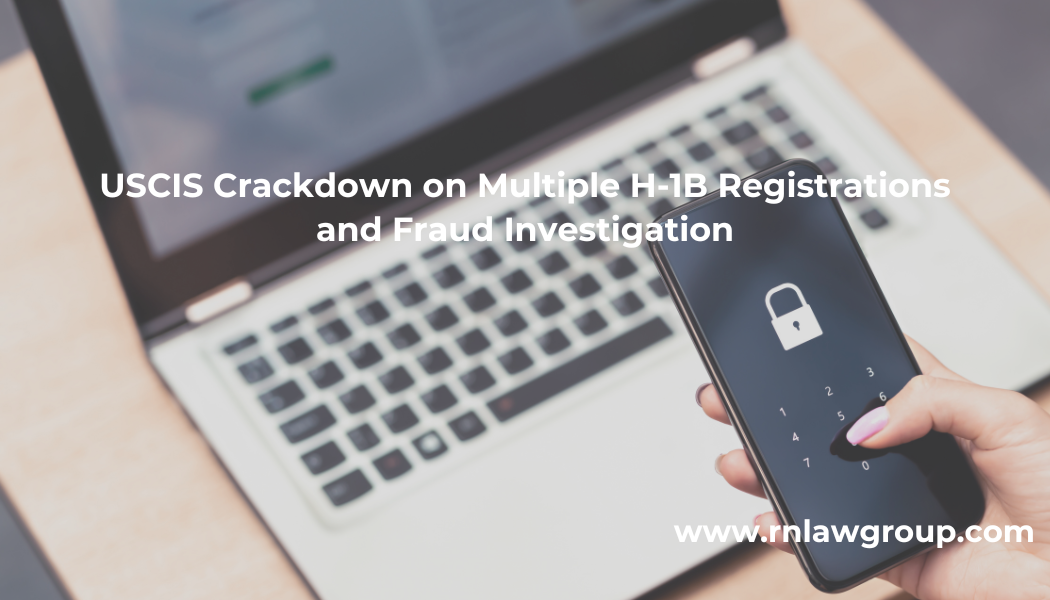
USCIS Crackdown on Multiple H-1B Registrations and Fraud Investigation
In recent years, some H-1B beneficiaries have attempted to increase their chances of selection by submitting multiple registrations through different sponsors. While this strategy may seem beneficial, U.S. Citizenship and Immigration Services (USCIS) has significantly increased scrutiny of these practices. USCIS is actively investigating registrations from past cycles, including FY 2023 and FY 2024, and is taking severe action against fraudulent multiple registrations [1]. Even if your multiple registrations occurred in previous years, such as March 2022 for the FY 2024 cap season, you are still at risk of facing severe consequences.
USCIS Crackdown and Fraud Investigations
USCIS publicly recognizes significant concerns regarding employers and beneficiaries collaborating to manipulate the lottery with duplicate registrations. Consequently, USCIS launched extensive fraud investigations, leading to numerous H-1B petitions being denied or revoked. Notices of Intent to Deny (NOIDs) and Notices of Intent to Revoke (NOIRs) have been frequently issued, and in severe cases, referrals for criminal prosecution have been made [1].
Investigations are not limited to the current fiscal year. USCIS is reviewing prior years’ registrations (FY 2023 through FY 2025) to detect fraudulent attempts. Beneficiaries previously selected via improper multiple registrations may now have their petitions closely reviewed, leading to denial, revocation, or even criminal referrals [1].
Historical Data Demonstrates Enforcement Impact
USCIS enforcement actions, particularly the new beneficiary-centric selection process implemented in FY 2025, have dramatically decreased multiple registrations. Historical data clearly illustrates this trend:
- FY 2021: 241,299 unique vs. 28,125 multiple registrations
- FY 2022: 211,304 unique vs. 90,143 multiple registrations
- FY 2023: 309,241 unique vs. 165,180 multiple registrations
- FY 2024: 350,103 unique vs. 408,891 multiple registrations (peak)
- FY 2025: 423,028 unique vs. 47,314 multiple registrations
- FY 2026: 336,153 unique vs. 7,828 multiple registrations [2]
This steep decline is directly correlated to USCIS’s enhanced enforcement measures and their shift toward beneficiary-focused registration.
Severe Legal Consequences
Engaging in fraudulent multiple registrations exposes beneficiaries to harsh immigration penalties. Misrepresentation of material facts, such as falsely attesting to separate genuine job offers, constitutes fraud under INA § 212(a)(6)(C)(i), resulting in a potential lifetime bar from entering the United States [3].
USCIS regulations clearly outline penalties for fraudulent registrations. Under 8 CFR 214.2(h)(10)(ii), improperly submitted registrations result in petition denial. Regulation 8 CFR 214.2(h)(11)(iii)(A)(2) allows USCIS to revoke approvals based on fraud or misrepresentation [4].
The Administrative Appeals Office reinforced these regulations in Matter of S- Inc. (Adopted Decision 2018-02), clarifying that multiple petitions filed by related entities for the same beneficiary without legitimate business justification will lead to denial or revocation [5].
Recommendations for H-1B Beneficiaries
If you suspect you were involved in multiple registrations, immediate action is essential:
- Consult an Immigration Attorney: Obtain professional legal advice to assess your situation and potential risks.
- Consider Petition Withdrawal: Proactively withdrawing suspicious petitions may be advisable to mitigate risk.
- Respond to USCIS Notices Promptly: If issued an RFE or NOIR, respond swiftly and thoroughly with professional legal assistance.
- Honesty and Transparency: Fully disclose facts during USCIS inquiries, possibly considering voluntary disclosure after consultation with your attorney.
References:
[1] USCIS, “H-1B Electronic Registration Process and Measures to Combat Fraud,” https://www.uscis.gov/working-in-the-united-states/temporary-workers/h-1b-specialty-occupations/h-1b-electronic-registration-process
[2] USCIS Historical Registration Data (FY 2021-2026), https://www.uscis.gov/working-in-the-united-states/temporary-workers/h-1b-specialty-occupations/h-1b-electronic-registration-process
[3] INA § 212(a)(6)(C)(i), Immigration and Nationality Act, https://www.uscis.gov/policy-manual/volume-8-part-j-chapter-3
[4] Code of Federal Regulations (8 CFR 214.2(h)), https://www.ecfr.gov/current/title-8/chapter-I/subchapter-B/part-214
[5] Matter of S- Inc., Adopted Decision 2018-02 (AAO Mar. 23, 2018), https://www.uscis.gov/sites/default/files/document/adopted_decisions/Matter-of-S-Inc-Adopted-Decision-2018-02.pdf
By: Rahul Reddy
Rahul Reddy is the founding partner of Reddy Neumann Brown PC. He founded our firm in 1997 and has over 28 years of experience practicing employment-based immigration. Rahul‘s vast knowledge of the complex immigration system makes him an invaluable resource and an expert in the field. His personal experience with the immigration system has made him empathetic to each of his clients’ cases and empowered him to help others achieve the American Dream.
Rahul‘s dedication to serving the immigrant community is evident, from his daily free conference calls to his weekly immigration Q&As on Facebook and YouTube Live. He is an active member of the immigrant community and one of the founders of ITServe Alliance. He has been a member of American Immigration Lawyers Association since 1995.

